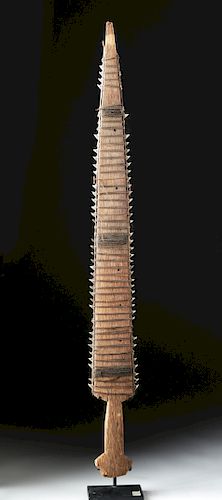Early 20th C. Oceanic Shark Tooth Sword w/ Human Hair
Lot 237
About Seller
Artemis Gallery
686 S Taylor Ave, Ste 106
Louisville, CO 80027
United States
Selling antiquities, ancient and ethnographic art online since 1993, Artemis Gallery specializes in Classical Antiquities (Egyptian, Greek, Roman, Near Eastern), Asian, Pre-Columbian, African / Tribal / Oceanographic art. Our extensive inventory includes pottery, stone, metal, wood, glass and textil...Read more
Estimate:
$1,500 - $2,000
Absentee vs Live bid
Two ways to bid:
- Leave a max absentee bid and the platform will bid on your behalf up to your maximum bid during the live auction.
- Bid live during the auction and your bids will be submitted real-time to the auctioneer.
Bid Increments
| Price | Bid Increment |
|---|---|
| $0 | $25 |
| $300 | $50 |
| $1,000 | $100 |
| $2,000 | $250 |
| $5,000 | $500 |
| $10,000 | $1,000 |
| $20,000 | $2,500 |
| $50,000 | $5,000 |
| $100,000 | $10,000 |
| $200,000 | $20,000 |
About Auction
By Artemis Gallery
Jun 20, 2019
Set Reminder
2019-06-20 10:00:00
2019-06-20 10:00:00
America/New_York
Bidsquare
Bidsquare : Ancient / Ethnographic From Around the World
https://www.bidsquare.com/auctions/artemis-gallery/ancient-ethnographic-from-around-the-world-4217
Around the world & back in time - be amazed at the treasures you will find. Antiquities from Egypt, Greece, Italy and the Near East, Asian, Pre-Columbian, African / Tribal / Oceanic, Native American, Spanish Colonial, Russian Icons, Fine Art, much more! All categories, all price ranges.. all legal Artemis Gallery info@artemisgallery.com
Around the world & back in time - be amazed at the treasures you will find. Antiquities from Egypt, Greece, Italy and the Near East, Asian, Pre-Columbian, African / Tribal / Oceanic, Native American, Spanish Colonial, Russian Icons, Fine Art, much more! All categories, all price ranges.. all legal Artemis Gallery info@artemisgallery.com
- Lot Description
Oceania, Gilbert Islands, ca. early 20th century CE. A fantastic spear made from a thick shaft of coconut wood, studded with two vertical rows of tightly-spaced shark's teeth that rise nearly all the way up the blade length. Each shark's tooth has been painstakingly sewn into place using te koro, twine made from coconut fiber. The wood was shaped using stone knives. The dark colored twine is probably made from human hair. It is amazing that the creators of this weapon were able to drill through the shark teeth in such a uniform fashion, given the hardness of the material. An integral handle is carved at the base of the blade. Size: 3.55" W x 32.1" H (9 cm x 81.5 cm); 33.6" H (85.3 cm) on included custom stand.
Some researchers have noted the similarities in shape between these weaponized shark teeth and traditional Gilbert Islands canoe sails, which were also supported on masts of coconut wood. This type of spear was used during ceremonial warfare, when ritual duels took place in order to maintain honor. Along with these weapons, warriors wore suits of armor made from thickly woven coconut fiber and a belt made from stingray skin, as well as a helmet made from a hollowed-out, dried puffer fish. Shark teeth were sewn into the backs of the armor gloves for when the fighting got close. Some historical photographs of the full costume are available here: https://wiki.ucl.ac.uk/display/BBCollabSupport/An+Ethnographic+Analysis+of+a+Kiribati+Shark-Toothed+Sword
Provenance: private Newport Beach, California, USA collection
All items legal to buy/sell under U.S. Statute covering cultural patrimony Code 2600, CHAPTER 14, and are guaranteed to be as described or your money back.
A Certificate of Authenticity will accompany all winning bids.
We ship worldwide and handle all shipping in-house for your convenience.
#135778Tip of blade is lost. Some of the shark's teeth are lost or partially lost as shown. The handle probably once had a woven covering that is now lost.Condition
- Shipping Info
-
All shipping is handled in-house for your convenience. Your invoice from Artemis Gallery will include shipping calculation instructions. If in doubt, please inquire BEFORE bidding for estimated shipping costs for individual items.
-
- Buyer's Premium



 EUR
EUR CAD
CAD AUD
AUD GBP
GBP MXN
MXN HKD
HKD CNY
CNY MYR
MYR SEK
SEK SGD
SGD CHF
CHF THB
THB














